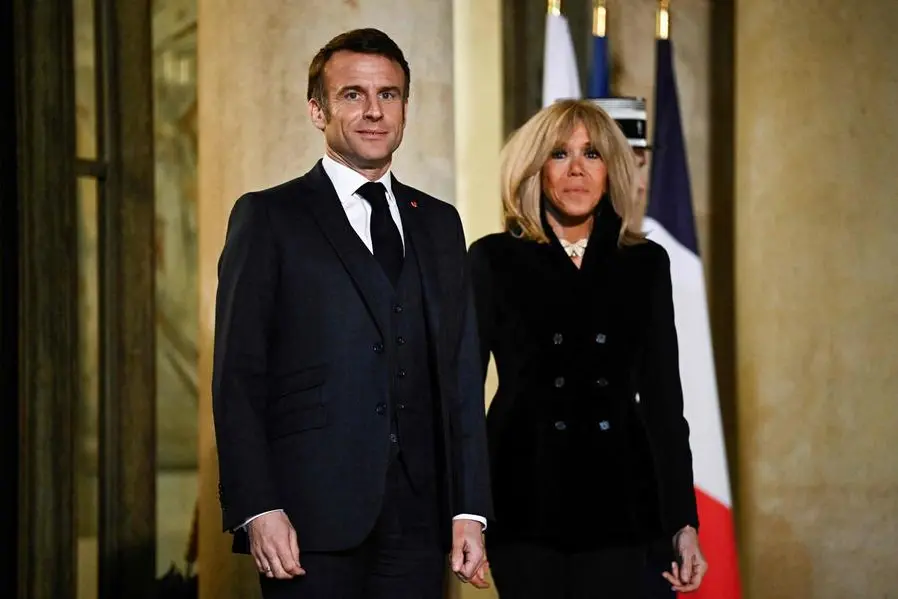PHOTO
French President Emmanuel Macron for half a decade sought to cultivate a partnership with Russia but has now become an implacable foe of the Kremlin, warning that Vladimir Putin poses a threat not just to Ukraine but the security of all Europeans.
Weeks after taking office in 2017, Macron signalled his intentions towards Russia by rolling out the red carpet for Putin at a summit in the former royal residence of the Versailles Palace.
In 2019, the Russian leader was invited to the French president's Mediterranean summer residence where Macron addressed Putin as "dear Vladimir" and famously declared Russia was part of a Europe that extended from "Lisbon to Vladivostok".
Even after Putin ordered Russian tanks into Ukraine in the February 2022 invasion, Macron sought to keep up a channel of dialogue with the Russian leader, speaking to him on multiple occasions until September that year and insisting on the need "not to humiliate Russia".
Macron openly acknowledges his position has now undergone a major turnaround, citing a "hardening" in Russia's stance at home and abroad, which has seen the prison death of opposition figure Alexei Navalny that supporters have blamed on the Kremlin, as well as a flurry of cyberattacks and disinformation campaigns against countries including France.
He has repeated as a mantra that "Russia cannot win this war" and shocked European allies in February by refusing to rule out the sending of Western ground troops.
"Who would think for a single second that President Putin, who did not respect any of his limits and engagements, would stop there?" he said in an interview with French television on Thursday, insisting there should be "no limits" in support for Ukraine and describing the war as "existential" for Ukraine and Europe.
Macron gave the interview on the eve of stage-managed presidential elections in Russia that should see Putin win another six-year term.
He also is in Berlin Friday for talks with German Chancellor Olaf Scholz, who has expressed discomfort with France's more bellicose stance, and Polish Prime Minister Donald Tusk.
"If Russia wins the life of the French will change. We will have no more security in Europe," Macron warned.
- From 'dove to hawk' -
A French presidential official, who asked not to be named, said that Macron had "gone to the end" in seeking a possible diplomatic path with Putin, even visiting Moscow in February 2022 in a last ditch attempt to prevent war.
After this "he (Macron) is the one who has the best justification to say that this path is not possible", the official said, adding: "It is the Kremlin which has changed, not him (Macron)".
The breakdown in their relationship is shown starkly in a February 2022 telephone conversation on the eve of the invasion -- which extremely unusually was filmed and broadcast in a French TV documentary - where both men drop diplomatic niceties for open shows of anger.
"Listen to me carefully! What's up with you?" said Putin in the conversation recorded in the documentary which was broadcast in the summer of 2022 but was shared virally on social media this week. In a sign of their previous intimacy, both men still use the informal "you" ("tu" in French, "ty" in Russian).
"The metamorphosis of Emmanuel Macron, the dove become hawk," said the Le Monde daily this week.
In an interview this week with French channel BFMTV, Ukrainian President Volodymyr Zelensky said Putin had "deceived" Macron by promising him and several leaders a few days before the war there would not be an invasion. "I think he realised that Putin had personally deceived him."
- 'Gallic cockerel' -
Macron's more assertive position, and in particular the warning that the sending of Western ground troops was not ruled out, has raised hackles in Russia.
Interviewing Putin this week, the star presenter with the state-run Rossiya channel Dmitry Kiselev asked the Russian leader "what has happened to Macron? Has he lost his marbles? ... He looks like a fighting Gallic cockerel! He has frightened all Europeans."
Putin swatted the question away, claiming that "such a sharp reaction, quite an emotional one" from Macron was linked to France losing influence in African countries where Russia has gained the upper hand through the Wagner mercenary group.
"Putin's position has not significantly changed. There are very serious changes in Macron's position," Sergei Markov, pro-Kremlin director of the Institute of Political Studies in Moscow, told AFP.
For Tatiana Kastoueva-Jean, Russia specialist at the French Institute of International Relations (IFRI), the change in Macron's stance towards Putin triggered this reaction from Russia.
"There is incomprehension (in Russia) over how someone who wants to discuss with Russia, to be the mediator, turns into someone who takes the lead of the toughest camp opposing it," she told AFP.





















